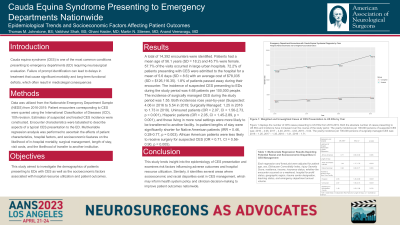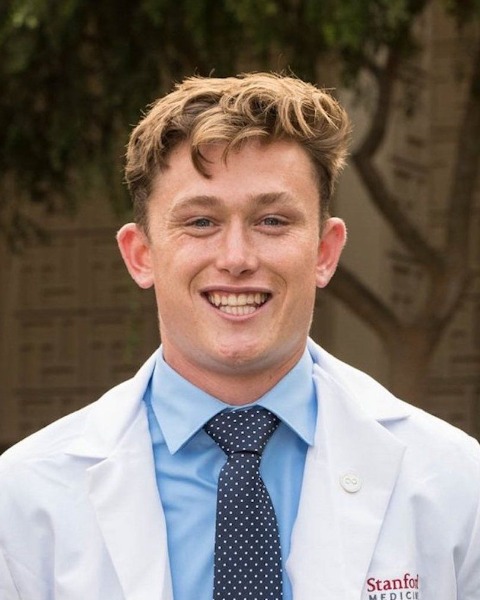Cauda Equina Syndrome in Emergency Departments Nationwide: Factors Influencing Resource Utilization and Mortality
Friday, April 21, 2023


Thomas M. Johnstone, BS (he/him/his)
Medical Student
Stanford University School of Medicine
Stanford, California, United States
ePoster Presenter(s)
Introduction: Cauda equina syndrome (CES) is one of the most common conditions presenting to emergency departments (ED) requiring neurosurgical evaluation. Failure of prompt identification can lead to delays in treatment that cause significant morbidity and long-term functional deficits, which often result in medicolegal consequences. The aim of this study was to describe the national epidemiology and risk factors associated with hospital resource utilization and mortality in patients presenting to EDs with CES.
Methods: Data was utilized from the Nationwide Emergency Department Sample (NEDS) for the years 2016-2019. Patient encounters corresponding to CES were queried by the International Classification of Diseases (ICD), 10th revision. Multivariable linear and logistic regression analysis was performed to ascertain the effects of patient and hospital related factors as well as socioeconomic factors on the likelihood of in-hospital mortality, length of stay, visit costs, and the likelihood of transfer to another hospital.
Results: A total of 14,392 encounters were identified. 72.2% of patients presenting with CES were admitted to the hospital for a mean of 5.6 days with the average cost of $78,035 and 1.8% of the total expired during that admission. Older patients (OR = 1.02, CI = 1.01-1.03, p < 0.01) and those with more co-morbid conditions (OR = 1.19, CI = 1.17-1.22, p < 0.01) had a higher risk of mortality. Hospitals designated as trauma centers were significantly more likely to have higher costs of treatment (p < 0.001). Patients with no insurance were more likely to get transferred from the ED to another short-term care facility (OR = 1.84, CI = 1.38-2.45, p < 0.01).
Conclusion : This study lends insight into the epidemiology of CES presentation and examines risk factors influencing adverse outcomes and hospital resource utilization, which may inform health system policy and clinician decision-making to improve patient outcomes nationwide.
Methods: Data was utilized from the Nationwide Emergency Department Sample (NEDS) for the years 2016-2019. Patient encounters corresponding to CES were queried by the International Classification of Diseases (ICD), 10th revision. Multivariable linear and logistic regression analysis was performed to ascertain the effects of patient and hospital related factors as well as socioeconomic factors on the likelihood of in-hospital mortality, length of stay, visit costs, and the likelihood of transfer to another hospital.
Results: A total of 14,392 encounters were identified. 72.2% of patients presenting with CES were admitted to the hospital for a mean of 5.6 days with the average cost of $78,035 and 1.8% of the total expired during that admission. Older patients (OR = 1.02, CI = 1.01-1.03, p < 0.01) and those with more co-morbid conditions (OR = 1.19, CI = 1.17-1.22, p < 0.01) had a higher risk of mortality. Hospitals designated as trauma centers were significantly more likely to have higher costs of treatment (p < 0.001). Patients with no insurance were more likely to get transferred from the ED to another short-term care facility (OR = 1.84, CI = 1.38-2.45, p < 0.01).
Conclusion : This study lends insight into the epidemiology of CES presentation and examines risk factors influencing adverse outcomes and hospital resource utilization, which may inform health system policy and clinician decision-making to improve patient outcomes nationwide.
